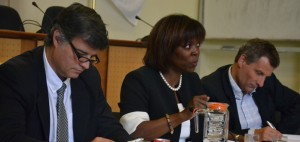July 28, 2014

Manuel Sanchez-Montero (AECID), Ertharin Cousin (WFP),
and Ed Schenkenberg (DARA)
The Spanish Agency for International Development Cooperation (AECID) and DARA held the third humanitarian aid diversity HardTalk dialogue with Ertharin Cousin, Executive Director, World Food Programme (WFP), July 7th. The debate took place within the context of the second round of the Humanitarian HardTalk series “The Multiple Faces of Humanitarianism.”
Ertharin Cousin: Challenges in WFP’s Food Assistance
The World Food Program (WFP) faces a variety of operational and strategic dilemmas to help feed and assist needy people around the planet. Aside from technical issues involving how to appropriately provide food assistance and how to ensure effective targeting that reaches the most vulnerable populations, the WFP deals with the complexities of developing the correct systems that would help in achieving people’s self-reliance. In light of these challenges, how does WFP best ensure that it appropriately provides food assistance on a global scale?
Some of the main issues that came up in the discussion were the following:
- Aid modalities: There is a need to explore and evaluate the different modalities for providing food assistance in humanitarian situations to ensure its maximum effectiveness and benefits for people’s survival and the communities in which they live. Where food is available, the humanitarian community has started a movement towards using vouchers and cash. In addition, humanitarian organizations are looking towards having one card that would contain the benefits from the various humanitarian organizations and governments that may be electronic (utilizing biometrics), a physical card, or a paper voucher, depending on the electronic systems available in the country.
- Building and strengthening partnerships: Humanitarian organizations rely heavily on each other in the implementation of their programs, and there is currently a recognition of the need to increase the level of cooperation, partnerships, and engagement between them in the provision of humanitarian aid. The challenge is ensuring that these partnerships are based on outcomes and not just outputs and developing the set of tools to evaluate them to best measure their impact and outcomes.
- Building resilience: The humanitarian community has recognized the importance of building resilience among the communities it serves to combat hunger. How do humanitarian organizations best implement agricultural development opportunities in rural communities to provide more opportunities for smallholder farmers and increase the durability of markets? How do they build institutions in urban communities to cut down on food wastage?
- One of the issues that the humanitarian community should address in the 2016 World Humanitarian Summit is that of funding and how to create a way for humanitarian actors to have enough money to serve victims of humanitarian crises.
- New Actors: One of the most significant challenges facing the humanitarian community is how to work with new actors in crises, some of which are not parties to the Geneva Convention and not supportive of providing the access needed to perform the work required to address humanitarian challenges. How do humanitarian organizations decide which actors to work with and will these actors listen to humanitarians? How do humanitarian organizations protect both their national and international staff that are committed to performing the work?
- Humanitarian organizations are currently struggling with how to best involve the private sector in supporting systems and development activity. How do they create a private sector strategy that addresses what they would like to achieve with the private sector in terms of partnerships and goals and also sets guidelines for criteria that private sector actors must meet in order to work with humanitarian organizations?
The second round of HardTalk Series
No one owns “humanitarian action” and there is no copyright on the word “humanitarianism,” which has been used to describe the principles and practices of humanitarian action. Some would say that the use of the word ‘humanitarian’ has been abused, as it has become a label to describe many different actions, many times far from anything resembling it, and sometimes to the point of extreme such as when in 1999 NATO called its intervention in the Kosovo conflict ‘a humanitarian war’.
DARA and AECID’s (Spanish Agency for International Development Cooperation) second round of Humanitarian HardTalk series aims to reflect on the widely diverging views on humanitarian action in the run up to the World Humanitarian Summit in 2016. For more information, view the full programme.
Read the summary of the first HardTalk in this series with Kristalina Georgieva, EU Commissioner.
Read the report “Now or Never: Making Humanitarian Action More Effective“, which contains the main points debated during the first round of Humanitarian HardTalk Series Dialogues in late 2013.
Share this